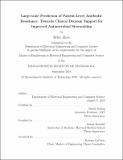Large-scale prediction of patient-level antibiotic resistance : towards clinical decision support for improved antimicrobial stewardship
Author(s)
Zhou, Helen(Helen L.)
Download1098216500-MIT.pdf (4.944Mb)
Other Contributors
Massachusetts Institute of Technology. Department of Electrical Engineering and Computer Science.
Advisor
David Sontag and Sanjat Kanjilal.
Terms of use
Metadata
Show full item recordAbstract
Antibiotics are critical to modern medicine. However, levels of resistance have been rising, exacerbated by over-prescription and misuse of antibiotics. One major reason for this inappropriate usage is that doctors often must decide treatment without the results of microbiologic testing, a setting known as the empiric treatment setting. Thus, this work aims to provide clinical decision support through patient-specific predictions of resistance at the point of care. Combining information from diagnoses, procedures, medications, clinicians' notes, and other modalities present in electronic medical records, various machine learning models such as logistic regression and decision trees are used to predict patients' probabilities of resistance to various antibiotics. The full dataset consists of electronic medical records from patients presenting to the Massachusetts General Hospital and the Brigham & Women's Hospital between 2007 and 2016. On samples from the urinary tract (UTIs), which comprise approximately 48% of microbiology samples, the models achieve test AUCs ranging from 0.665 to 0.955 (depending on the antibiotic). To evaluate the practical utility of these models, we extract the uncomplicated UTI cohort. Combining model predictions with well-defined treatment guidelines, a decision algorithm is constructed to recommend antibiotic treatments. For uncomplicated UTIs, the algorithm reduces test set prescriptions of broad-spectrum antibiotics by about 6.6%, while retaining similar levels of inappropriate antibiotic therapy.
Description
This electronic version was submitted by the student author. The certified thesis is available in the Institute Archives and Special Collections. Thesis: M. Eng., Massachusetts Institute of Technology, Department of Electrical Engineering and Computer Science, 2018 Cataloged from student-submitted PDF version of thesis. Includes bibliographical references (pages 93-96).
Date issued
2018Department
Massachusetts Institute of Technology. Department of Electrical Engineering and Computer SciencePublisher
Massachusetts Institute of Technology
Keywords
Electrical Engineering and Computer Science.